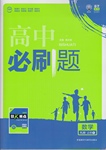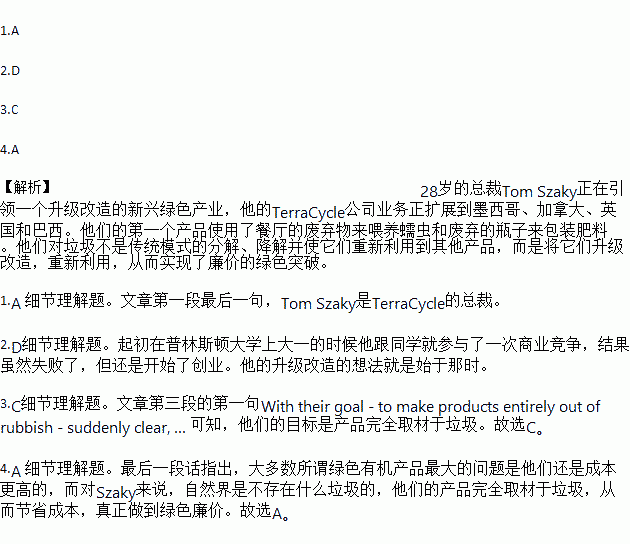题目内容
When Tom Szaky sees a juice container thrown away, he doesn't see rubbish, but he sees a pencil case. Sweet wrappers? A beautiful kite! But these are not the imaginings of a dreamer. For the 28-year-old CEO of Trenton, New Jersey-based TerraCycle, they’re a business model.
The fast-talking Szaky is leading the new industry of upcycling(升级改造). Instead of recycling (shredding or breaking down materials and enabling them to be reproduced as other products), TerraCycle takes packaging headed for landfills(废物填埋地)and reuses it - more or less whole. TerraCycle’s 85 employees make nearly 200 products, sold at shops such as Petco, Kmart, Whole Foods Market, and Target.
Szaky’s $7.4 million company, now also moving ahead in Mexico, Canada, the United Kingdom and Brazil, is quite different from the business he founded with classmate Jon Beyer in 2002 as a freshman at Princeton University. The two entered a business competition with a plan to sell organic plant fertilizers made from worm waste. They lost the competition, but started the business anyway.
With their goal - to make products entirely out of rubbish - suddenly clear, Szaky knew the time was right to drop out of Princeton.
TerraCycle’s first product used dining-hall waste to feed the worms and thrown-away bottles to package the fertilizer. The result: a cheap, green breakthrough. Word spread, and in 2004, Home Depot began carrying the fertilizer in its Canadian stores.
To Szaky, waste does not exist in nature. TerraCycle is a “second chance” employer of, say, a piece of furniture, an ice-cream container. As Szaky points out, “The biggest problem with most green, fair-trade, and organic products is that they tend to cost more. At TerraCycle, everything is made from rubbish, and rubbish is free. People should be able to protect the planet without having to pay a cost for that right.”
1.What is Tom Szaky now?
A. The CEO of TerraCycle. B. An employee of Home Depot.
C. A student at Princeton University D. The manager of a food company.
2.How did Szaky get the idea of upcycling?
A. From his visits to foreign companies.
B. From his studies at Princeton University.
C. Through shopping at big stores in America.
D. Through the experience of a business competition.
3.What is the goal of TerraCycle?
A. To make cheap and green products.
B. To recycle waste materials in another way.
C. To make products completely out of rubbish.
D. To change worm waste into organic plant fertilizers.
4.What is the advantage of upcycling according to Szaky?
A. The cost is kept rather low. B. More materials are available.
C. It has a large promising market D. Its products are environmentally friendly.
 高中必刷题系列答案
高中必刷题系列答案
